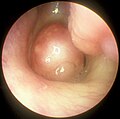Functional endoscopic sinus surgery
Functional Endoscopic Sinus Surgery (FESS) is a minimally invasive surgical procedure used to treat sinusitis and other related sinus disorders. FESS aims to restore normal drainage and function of the sinuses by removing anatomical and pathological obstructions. This technique relies on the use of endoscopes to provide a visual guide for the surgeon while operating on the sinus cavities through the nostrils, thus avoiding external incisions.
History
The development of FESS can be traced back to the 1950s, but it was not until the 1980s that it became widely adopted, thanks to advancements in endoscopic technology. The procedure was pioneered by Walter Messerklinger and Heinz Stammberger from Austria, who emphasized the importance of the ostiomeatal complex in sinus drainage.
Indications
FESS is indicated for chronic or recurrent sinusitis that is unresponsive to medical therapy, nasal polyps, sinus tumors, cerebrospinal fluid (CSF) leaks, and certain conditions of sinus obstruction. It is also used in the treatment of fungal sinusitis and as part of the surgical approach to remove pituitary tumors via the sphenoid sinus.
Procedure
The FESS procedure is performed under general anesthesia. The surgeon inserts an endoscope into the nostril to visualize the sinus cavities. Specialized instruments are then used alongside the endoscope to remove the obstructive tissue and open the pathways to the sinuses. The goal is to enlarge the natural drainage pathways of the sinuses and to remove diseased tissue while preserving normal structures.
Advantages
FESS offers several advantages over traditional sinus surgery methods, including less postoperative pain, reduced bleeding, shorter recovery time, and the avoidance of external incisions and scars. It allows for a more targeted approach, reducing the risk of damage to surrounding tissues.
Risks and Complications
As with any surgical procedure, FESS carries risks and potential complications. These may include bleeding, infection, an adverse reaction to anesthesia, and damage to surrounding structures such as the optic nerve or the skull base, leading to cerebrospinal fluid (CSF) leaks. However, serious complications are rare.
Recovery
Postoperative care is crucial for a successful recovery. Patients may be advised to use saline nasal sprays or undergo nasal irrigation to keep the nasal passages moist and clear of debris. Nasal packing, if used, is typically removed a few days after surgery. Most patients can return to normal activities within a few weeks, but full recovery and the final outcome of the surgery may not be apparent for several months.
Conclusion
Functional Endoscopic Sinus Surgery has revolutionized the treatment of sinus disorders, offering a less invasive option with a quicker recovery time and fewer complications compared to traditional methods. It has become the standard of care for patients with chronic sinusitis and other sinus diseases that do not respond to medical treatment.
Transform your life with W8MD's budget GLP-1 injections from $125.
W8MD offers a medical weight loss program to lose weight in Philadelphia. Our physician-supervised medical weight loss provides:
- Most insurances accepted or discounted self-pay rates. We will obtain insurance prior authorizations if needed.
- Generic GLP1 weight loss injections from $125 for the starting dose.
- Also offer prescription weight loss medications including Phentermine, Qsymia, Diethylpropion, Contrave etc.
NYC weight loss doctor appointments
Start your NYC weight loss journey today at our NYC medical weight loss and Philadelphia medical weight loss clinics.
- Call 718-946-5500 to lose weight in NYC or for medical weight loss in Philadelphia 215-676-2334.
- Tags:NYC medical weight loss, Philadelphia lose weight Zepbound NYC, Budget GLP1 weight loss injections, Wegovy Philadelphia, Wegovy NYC, Philadelphia medical weight loss, Brookly weight loss and Wegovy NYC
|
WikiMD's Wellness Encyclopedia |
| Let Food Be Thy Medicine Medicine Thy Food - Hippocrates |
Medical Disclaimer: WikiMD is not a substitute for professional medical advice. The information on WikiMD is provided as an information resource only, may be incorrect, outdated or misleading, and is not to be used or relied on for any diagnostic or treatment purposes. Please consult your health care provider before making any healthcare decisions or for guidance about a specific medical condition. WikiMD expressly disclaims responsibility, and shall have no liability, for any damages, loss, injury, or liability whatsoever suffered as a result of your reliance on the information contained in this site. By visiting this site you agree to the foregoing terms and conditions, which may from time to time be changed or supplemented by WikiMD. If you do not agree to the foregoing terms and conditions, you should not enter or use this site. See full disclaimer.
Credits:Most images are courtesy of Wikimedia commons, and templates, categories Wikipedia, licensed under CC BY SA or similar.
Contributors: Prab R. Tumpati, MD



